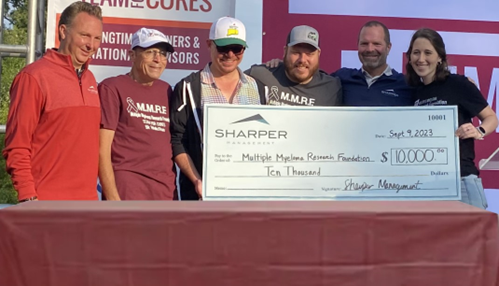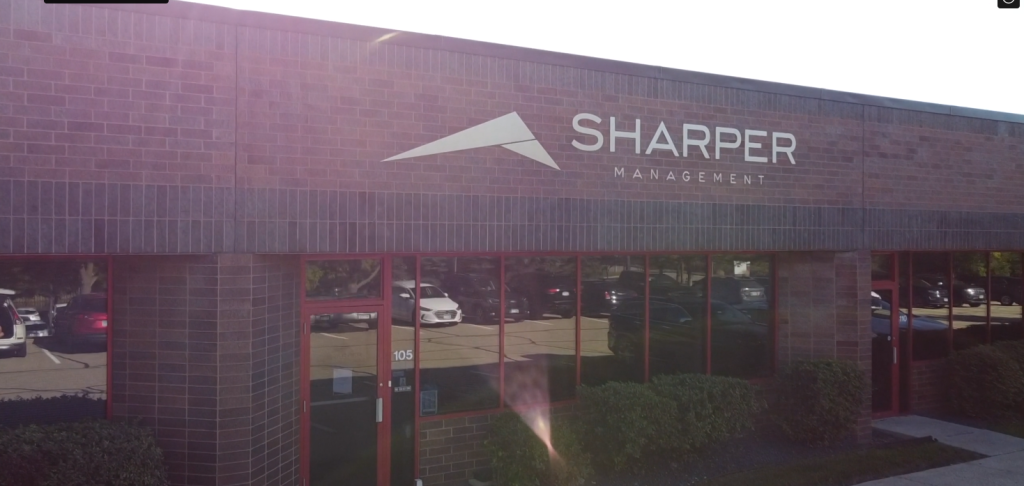Board Training Opportunity – July 24th

The next session in the quarterly series of Board Training opportunities will be held on Wednesday, July 24th, 6 p.m. at the Wells Fargo Plaza, 2nd Floor Training Room at 7900 Xerces Avenue in Bloomington, MN 55431. The 90-minute session will be led by director of business development and education, Josh Reams, CMCA, AMS, PCAM – and will focus on Governing Documents If you are interested in reserving your spot, please email: clientcare@sharpermanagement.com
Board Tips: Make Your Meetings Matter

There’s no denying that we live in a culture of meetings. The ease and accessibility of virtual meetings have furthered exasperated the reactionary notion of “let’s get together to talk it through.” As we approach the spring/summer season and the cadence of Board meetings increase, step back and consider two things – Frequency and Productivity. Meeting Frequency – how often are you meeting as an association Board? This will certainly vary. Your Governing Documents may dictate a number of meetings to be held within a calendar year. The size and complexity of your community may require more or less meeting regularity. And situational issues or projects may dictate the volume necessity for a “meeting of the minds.” Consider the notion, however, that the more often you meet, the less productive you may be. Fewer meetings force focus – and therefore motivation to have tangible outcomes and measurable initiatives. Consider evaluating your meeting productivity. If you find that decisions are often times delayed or tabled, if your meetings are more social than business, and certainly if you have a limited number of items on your docket, consider having fewer meetings. See how it goes. The results might surprise you! Productivity = Action List – to ensure that the meeting was, in fact, constructive with measurable outcomes, it is helpful to have a summary identifying assigned tasks. Make a list! As Managers, we refer to this as an “Action Item List.” These can even be incorporated into the Meeting Minutes if it reflects a New Business decision or resolution of the Board. Towards the end of a meeting, it is natural for people to just want to get home. Verbally summarizing and capturing, in writing, all action items is imperative. To make your meetings matter, reconsider frequency and have measurables/outcomes. You’ll find the two go hand-in-hand!
Board Training Opportunity – April 24th

The second in the quarterly series of Board Training opportunities will be held on Wednesday, April 24th, 6 p.m. at the Wells Fargo Plaza, 2nd Floor Training Room at 7900 Xerces Avenue in Bloomington, MN 55431. The 90-minute session will be led by director of business development and education, Josh Reams, CMCA, AMS, PCAM. This session will focus on defining the roles and responsibilities of the Board, and property management practices. Topics include: · Roles & Responsibilities of the Board· Officer Positions & Duties· Legal Obligations & Protections· Committees· Property Management Practices· Organizational Tools & Tips If you are interested in reserving your spot, please email:clientcare@sharpermanagement.com
Sharper Gives Back

Each year Sharper chooses a cause or organization that will be the benefactor of this annual event. MMRF is a wonderful organization that is “commitment to advancing health equity so that all myeloma patients can benefit from the scientific and clinical advances we pursue. Since our inception, the MMRF has committed over $500 million for research, opened nearly 100 clinical trials, and helped bring 15+ FDA-approved therapies to market, which have tripled the life expectancy of myeloma patients.” Check them out at https://themmrf.org/ “Giving back to our community is one of our core values at Sharper Management,” said Dan Cunningham, owner and CEO. “As with any cancer type, Multiple Myeloma is a devastating condition. Unfortunately, it has affected the family of one of our staff in a significant way. They have found a great resource in the MMRF, though. It means a great deal to us to be able to support them and all of the families affected by Multiple Myeloma.”
A Look Ahead to 2024 & Back at 2023

2023 has been another great year for Sharper Management! To name just a few successes— Continued growth in welcoming 31-new clients. In doing so, we passed a milestone of 200 associations managed. We also continue a strong retention rate of existing clients. We opened a satellite office in Maple Grove. This summer we rolled out significant upgrades to our software platform and web portal offering – perhaps most notably, a wonderful architectural request tracking and approving feature. This winter we will be integrating new software to help streamline the scheduling and management of our maintenance team. We continue our passion for training. We offered four sessions attended by nearly 200 Board members, representing over 60 different associations This spring we also rolled out our Educational Video Library, featuring 90 videos on dozens of different topics. We had another successful Sharper Scramble Golf Tournament and for the first time ever we topped $10,000 in proceeds, which were donated to the Multiple Myeloma Research Foundation. Sharper was also a feature of our industry’s trade organization (Community Association Institute) annual Vision Awards – receiving nine nominations. See Vision Awards article for details. The achievements of 2023 are many. What we continue to be most proud of, however, is the cohesion and growth of our talented team. We welcomed five new managers this year, each of them a seasoned veteran, uniquely talented, with years of industry experience. We also added positions in our Accounting, Maintenance and Client Care departments. And in an industry plagued by retention issues, we continue to excel in our staff retention. As we look to 2024, we have lots of exciting things on the horizon. See the 2024 Event Calendar article below. We look forward to sharing updates with you through these quarterly newsletters. All of us at Sharper would like to thank you for being a valued client. We thank you for being a part of a great 2023 and look forward to an exciting 2024. And, finally, we wish you and your family a safe, healthy and happy Holiday Season! Legislative Changes Effecting HOAs The 2023 legislative session in Minnesota was an active one. There were a number of significant bills that will, and have, impacted community associations in the state. Some legislative items went into effect this year. See our July newsletter for a detailed listing. As we approach 2024, there is one significant bill that effects some standard day-to-day operations and governance of your association. Violations & Rule Enforcement – in effort to create more uniformity in how rule violations are notified, fines assessed and appeals processed, the Minnesota Common Interest Ownership Act (MCIOA) was amended to create further standards. What it Says – any fine associated with a rule violation has to meet seven specific criteria or it could be challenged in a court. Homeowners are also entitled to a more consistent processes for an appeal and hearing of said fine. Who it Affects – all associations that are currently under MCIOA, which is any association built after June 1, 1994 – and any condominium association regardless of when it was established. What it Means – Any fine and certain assessments must be accompanied by a dated, written notice to the Owner that includes seven specific pieces of information. (1) states the amount and reason for the fine or assessment (2) for fines levied under section 515B.3-102(a)(11) [VIOLATION OF GOVERNING DOCUMENTS], specifies: (i) the violation for which a fine is being levied and the date of the levy; and (ii) the specific section of the declaration, bylaws, rules, or regulations allegedly violated; (3) for assessments levied under section 515B.3-115(g) or 515B.3-1151(g) [DAMAGE TO COMMON ELEMENTS OR A UNIT], identifies: (i) the damage caused; and (ii) the act or omission alleged to have caused the damage; (4) states that all unpaid fines and assessments are liens which, if not satisfied, could lead to foreclosure of the lien against the owner’s unit; (5) describes the unit owner’s right to be heard by the board or a committee appointed by the board; (6) states that if the assessment, fine, late fees, and other allowable charges are not paid, the amount may increase as a result of the imposition of attorney fees and other collection costs; and (7) informs the unit owner that homeownership assistance is available from the Minnesota Homeownership Center When it Goes into Effect – January 1, 2024
2024 Sharper Event Calendar

Mark your calendars for the following Sharper events, which are all free to you as a valued client and Board member. Board Training Opportunity – January 24 The first in our quarterly Board Training sessions will be Wednesday, January 24, 2024, 6 p.m. at the Wells Fargo Plaza, 2nd Floor Training Room at 7900 Xerces Avenue in Bloomington, MN 55431. The 90-minute session will be led by director of business development and education, Josh Reams, CMCA, AMS, PCAM. This session will focus on defining associations and association meetings. Topics include: If you are interested in reserving your spot, please email clientcare@sharpermanagement.com 2024 Save-the-Dates Board Training Schedule: January 24 – Board Training: Associations Defined & Association Meetings February 21 – New Client Orientation April 24 – Board Training: Roles & Responsibilities of the Board & Property Management Practices July 24 – Board Training: Associations Defined & Governing Documents July 26 – July Sharper Scramble Golf Tournament August 22 – New Client Orientation & Board Member Appreciation BBQ October 23 – Board Training: Insurance & Financials
Board Training Opportunity – October 25th

The next Board Training opportunity is set for Wednesday, October 25th, at 6 p.m. at the Wells Fargo Plaza at 7900 Xerxes Avenue in Bloomington. This free 90-minute session will focus on financials and insurance. Led by Sharper’s director of business development and education, Josh Reams, and Insurance Warehouse principal Eric Skarnes, topics will include: Insurance Basics: · Defining Policy Types & Coverages · Understanding Deductibles · Marketplace Update Financial Fundamentals: · Setting & Managing Operating Budgets · Reserve Fund Requirements · Understanding Reserve Studies · Basic Financial Reports · Audit/Review & Tax Requirements If you are interested in reserving your spot for this free training opportunity, email clientcare@sharpermanagement.com
Successful Sharper Scramble

Another successful Sharper Scramble Golf Tournament is in the books! On Friday, July 14th, Sharper hosted over 150 people for a day of fun, food, fellowship, and golf at Boulder Pointe Golf Club in Elko. We had 104 golfers, equally made up of our loyal and trusted business partners, Sharper staff members, and valued Board members from our client base. It was a wonderful day designed for these three groups to come together to celebrate Sharper Management. Thanks to our generous sponsors and people who donated throughout the day, we raised an impressive $10,000 to go towards this year’s benefit – the Multiple Myeloma Research Foundation. We look forward to delivering the big check to them next month. We hope you can join us when we host our 8th annual golf tournament next year. It is free to you as a Board member. Watch for a date to be announced in the winter newsletter, and secure your spot early. To those that attended this year, thank you for joining us, and we hope to see you next year!
Legislative Changes Affecting HOAs

The 2023 legislative session in Minnesota was active, with several significant bills that will impact community associations in the state. Below is an abbreviating listing of those topics. As the laws are further defined and incorporated into daily living in HOAs, we will continue diving deeper into these topics in future newsletters and publications. Marijuana/Cannabis A controversial topic, to be sure, that has been swirling around Minnesota for the past few years became a new law – Minn. Stat. #342. As a part of the comprehensive language passed, specific points related to associations and multi-resident/unit dwellings. We have to look at it in two ways. One issue is smoking, and the second is growing. Associations will have to navigate both problems. What it Says – generally, smoking or vaping in multi-resident/unit housing is unlawful and a nuisance under the statute. Growing is allowed with some limitations (maximum of eight plants). When it comes to growing, it does get a little more complicated. The new law allows people to grow up to eight cannabis plants, with no more than four being mature; flowering plants may be grown at a single residence. Must be the primary residence of a person 21 or older. If outside, it must be (1) enclosed; (2) locked; and (3) not visible to the public. The current law does not reference multi-family/unit developments (HOAs). Whom it Affects – all HOAs What it Means – Vaporizing or smoking cannabis flowers, cannabis products, artificially derived cannabinoids, or hemp-derived consumer products is prohibited in multi-family housing buildings, including balconies and patios. By existing state statute, boards also can govern common areas, including prohibiting smoking or vaping of cannabis products if they so choose. When it comes to growing, the association still controls common areas and can prohibit growing in limited common and common areas. However, they cannot regulate or disallow growing inside of the unit/home. The association’s Declarations would have to be amended to specifically disallow it. That said, the association does have the ability to manage and respond to nuisance issues. Both state statutes and Declarations typically say something to the effect of: Quiet Enjoyment; Interference Prohibited. All Owners and Occupants and their guests shall have a right to peaceful enjoyment in their respective Units. They shall use the Property in such a manner as will not cause a nuisance nor unduly restrict, interfere with, or impede the use of the Property by other Owners and Occupants and their guests. Should the growing of cannabis create issues, such as smell, and other owners complain, the association does have the right to ask an owner to cease the activity that made said nuisance. This issue could become challenging for an association to navigate, and it should seek legal counsel. When it Goes into Effect – July 1, 2023 Summary: our friends at the Smith, Jadin, and Johnson law firm recently spoke to Sharper Manager at length on this issue. An overview of their recommendations is as follows: Send an update to Owners regarding the marijuana bill explaining that as multifamily housing, smoking and vaping are prohibited. Take any complaints seriously and send violations consistent with Rule enforcement procedures. Keep a good paper trail. For complaints lodged, Board will need to know (1) when the alleged violation occurred and (2) who was the violator. If an Owner complains that they “smell” smoke, they can’t send a violation to every Owner. However, a general “reminder” email blast may help paper the file in case of a nuisance lawsuit. If a lawsuit for nuisance arises – 1. If procedures are followed (sent violation), tell Owner you have enforced and that they must drop the case or else the HOA will defend itself and assess fees • 2. If procedures are not followed, settle Solar Panels Like satellite dishes 20 years ago, associations must navigate homeowners wishing to install solar panels on rooflines. This has been a discussion amongst legislative bodies for the past few years. This year it finally got traction, and Minn. Stat. # 500.216 was passed. The bottom line, the new law limits some associations from prohibiting solar panels on rooflines. What it Says – “Notwithstanding any … homeowners association document, … a private entity must not prohibit or refuse to permit the owner of a single-family dwelling to install, maintain, or use a roof-mounted solar energy system.” Whom it Affects – Single family HOAs and any HOAs where the Owner is responsible for maintaining and insuring the dwelling (roofs, siding). Note that this bill does NOT apply to HOAs with shared roofs (such as a standard townhome). What it Means – Single-family HOAs may want to create a policy that could set parameters, requirements, and approval processes around solar panels. Examples include: Require only licensed contractors; prohibit materials extending beyond rooflines; require Owners to indemnify the HOA for any damages; require Owners remove the system if necessary to repair or replace something the HOA maintains. When it Goes into Effect – August 1, 2023 Violations & Rule Enforcement To create more uniformity in how rule violations are notified, fines assessed, and appeals processed, the Minnesota Common Interest Ownership Act (MCIOA) was amended to develop further standards. What it Says – any fine associated with a rule violation has to meet seven specific criteria, or it could be challenged in court. Homeowners are also entitled to a more consistent process for an appeal and hearing of said fine. Whom It Affects – all associations currently under MCIOA, which is any association built after June 1, 1994, and any condominium association regardless of when it was established. What it Means – Any fine and specific assessments must be accompanied by a dated, written notice to the Owner, including seven pieces of information. (1) states the amount and reason for the fine or assessment (2) for fines levied under section 515B.3-102(a)(11) [VIOLATION OF GOVERNING DOCUMENTS], specifies (i) the violation for which a fine is being levied and the date of the levy; and (ii) the specific section of the declaration, bylaws, rules, or regulations allegedly violated; (3) for assessments levied under section 515B.3-115(g) or
Insurance Market Troubles

The insurance market for HOAs has been volatile, at best, for the last decade. 2023 has been horrendous on a number of fronts. For most associations, premium increases have been somewhere between 20-40%. For some, the primary business/structural policy premium has doubled. And for a rapidly growing number of associations, surprising news of non-renewals has left them scrambling to find coverage elsewhere in an already consolidated market. Unfortunately, the future doesn’t give any optimistic signs of improvement. Although Minnesota is not alone in this troubling trend, we have been hit harder than most states. For five consecutive years, Minnesota has ranked in the top-5 in the nation for losses paid out. Florida has hurricanes. California has wildfires. Minnesota is the bullseye for hail. Minnesota has now been labeled as a “catastrophic state” by most insurance carriers, shrinking the market’s interested providers and inflating the rates for those offering coverage. One local industry expert calculated that for every $1 of premium collected, the insurance market has paid out $1.44 in losses for the multi-family sector. In response, carriers have not only increased premiums, but also wind-hail deductibles have increased to the point they no longer even pay out for hail damage; they’ve increased the number of “exclusions” on policies, and thus reduced the scope of coverage and further complicating claims; they have decreased the “cash value” and valuations on claims. While premium increases have been challenging, the real trouble in 2023 has been the shrinking market of providers and non-renewals. One industry expert with Insurance Warehouse estimated that there are only two or three carriers that will even write new policies for a townhome-style association right now. The big names, such as American Family, State Farm, Farmers, etc., have steadily been non-renewing associations with claims history and choosing to refrain from writing any new policies for multi-family developments. Many associations have had to go to the “secondary market” of carriers, which only fulfills the association’s requirement to have insurance, but offers little coverage and inflated premiums. The insurance market for associations is really in a state of crisis. In summary, carrier selections are becoming fewer, non-renewals more common, and drastically increasing premiums are the norm. Associations need to be aware of these challenges and be prepared financially.
